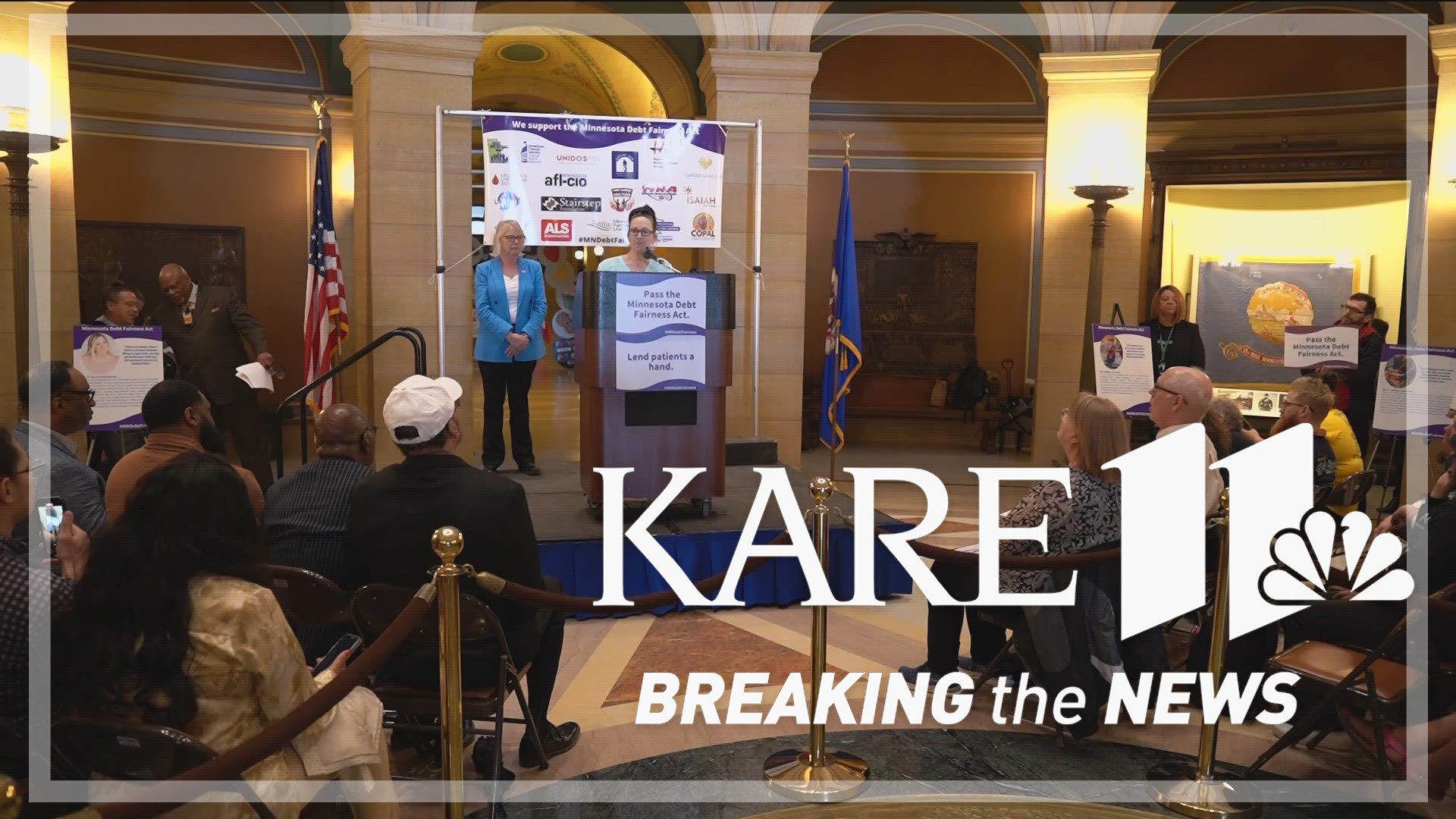ST PAUL, Minn. — The Minnesota House Monday night passed the Commerce Policy Bill after hours of debate. The legislation includes several medical debt reforms known collectively as the Debt Fairness Act.
The bill would bar medical providers from denying care due to unpaid medical debt. It would ban the practice of transferring a dead patient's medical debt to a surviving spouse. It would also prohibit medical providers from reporting unpaid medical debt to credit bureaus.
Among those who rallied in the Rotunda in support of the bill was Jen Schultz, a public relations professional and adjunct professor at Concordia University in St. Paul.
"I'm a four-time cancer survivor and a lot of times it feels like I'm in a constant cycle of medical debt," Schultz told KARE.
"I've had so many situations where I've had to choose between buying groceries or paying a full medical bill or putting gas in my car."
She said the bills pile up for people who, like her, have had multiple bouts of cancer because providers need to constantly check for recurrences.
"Oncology appointments, scans, ultrasounds, biopsies, medication, treatment, and so on."
Sen. Liz Boldon, the Rochester Democrat who's the lead author of the Senate version of the bill, is also a hospital nurse. She said the stress of medical debt affects her patients.
"Far too often the patients I take care of in the hospital, while they should be focusing on care and rest and recovery, they are worried and nervous and overwhelmed because of the debt they’re accruing while they’re in the hospital," Sen. Bolden said.
The legislation in its current form also bars debt collectors from going after your tax refunds.
"We’re protecting property tax refunds and eliminating the practice of revenue recapture for medical debt so hospitals and ambulance services cannot take your tax returns anymore," Rep. Liz Reyer, the Eagan Democrat who is carrying the bill in the House, told those at the rally.
The event drew a broad coalition of faith leaders, labor unions, patient groups, farmers and immigrant laborers, pressing lawmakers to bring some relief.
Attorney General Keith Ellison said too many patients are crushed by medical debt feeling helpless. He said the coalition supporting the bill were united in seeking justice for consumers.
"This is a moral issue. It’s not just a legal issue. It’s not just a political issue. It is a moral imperative to pass this bill today!"
Opposition to the bill
Resistance to this bill has come from credit agencies and hospital groups that have cautioned lawmakers about unintended consequences of changing the rules. They raised some of those issues when the Senate Commerce Committee heard the bill March 14.
Danny Ackert of the Minnesota Hospital Association said hospitals wrote off $537 million in uncollectible debt in 2022, and $280 million of that was from patients with insurance who couldn't afford their copays and deductibles.
"The hospital association is concerned that provisions in Senate File 4065 pertain to medical debt in combination are not appropriately balanced," Ackert told the panel.
"And that will lead to more nonprofit hospitals and healthcare providers generally taking on increased levels of unrecoverable bad debt. And, in totality, may come at the expense of securely sustaining the already precarious state of the healthcare workforce, care capacity and patient access Minnesotans need."
Jessica Klander, speaking for the Great Lakes Credit and Collections Association, said her group was especially concerned about the part of the bill that protects $4,000 of a patient's bank account from being garnished by debt collectors.
"This will effectively prohibit the use of bank garnishments as a collection tool in Minnesota. Very few people maintain a $4,000 account balance at any given time. And those that do can simply move the money around between their accounts to simply avoid the obligation," Klander said.
"Often a bank garnishment summons is the first time a consumer engages and responds to the collection actions that have been going n for years. This allows an opportunity to work with the consumer toward a payment plan and negate the need for the garnishment at all."
The bill passed the House Monday night on a straight party line vote with 70 Democrats in favor and 61 Republicans opposed.
WATCH MORE ON KARE 11+
Download the free KARE 11+ app for Roku, Fire TV, Apple TV and other smart TV platforms to watch more from KARE 11 anytime! The KARE 11+ app includes live streams of all of KARE 11's newscasts. You'll also find on-demand replays of newscasts; the latest from KARE 11 Investigates, Breaking the News and the Land of 10,000 Stories; exclusive programs like Verify and HeartThreads; and Minnesota sports talk from our partners at Locked On Minnesota.
- Add KARE 11+ on Roku here or by searching for KARE 11 in the Roku Channel Store.
- Add KARE 11+ on Fire TV here or by searching for KARE 11 in the Amazon App Store.
- Learn more about the KARE 11+ app for Apple TV in the Apple App Store.
- Learn more about KARE 11+ here.
Watch more local news:
Watch the latest local news from the Twin Cities and across Minnesota in our YouTube playlist:

